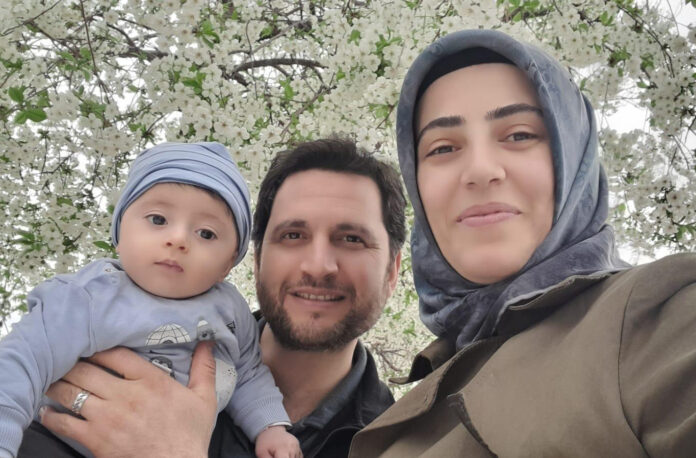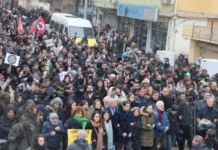A Turkish woman previously sentenced to almost seven years in prison over alleged links to the faith-based Gülen movement has been jailed along with her 6-month-old son after attempting to flee to Greece, the TR724 news website reported.
Özlem Düzenli was detained on May 10 in the border town of İpsala, Edirne province, near the Greek border, as she and her husband, İbrahim Düzenli, sought to leave the country. While İbrahim was released, Özlem was transferred to Edirne L-Type Closed Prison along with their infant son, Murat Efe.
Shortly after her detention, the mother and child were held in police custody for three days. During that time the infant developed a respiratory infection. “They took him to İpsala State Hospital,” İbrahim said. “He had developed an infection in his lungs, and his tonsils were inflamed.”
But after their transfer to the prison, Murat Efe’s condition worsened. “His fever reached 39 degrees,” İbrahim said. “My wife pressed the emergency button and banged on the cell door, but no one responded.”
For two days Düzenli tried to care for her son herself. No one took him to a hospital despite her repeated appeals.
Turkish President Recep Tayyip Erdoğan has been targeting followers of the Gülen movement, inspired by the late Muslim cleric Fethullah Gülen, since the corruption investigations of 2013, which implicated then-prime minister Erdoğan, his family members and inner circle.
Dismissing the investigations as a Gülenist coup and conspiracy against his government, Erdoğan designated the movement as a terrorist organization and began targeting its members. He intensified the crackdown on the movement following an abortive putsch in 2016, which he accused Gülen of masterminding. Gülen and the movement strongly deny involvement in the coup attempt or any terrorist activity.
According to İbrahim, the family was forced to flee the country after being systematically cut off from housing, healthcare, work and social support. “After our son was born, my wife couldn’t access any healthcare. They denied her public insurance because I was in prison,” he said. “You can’t go to the hospital, can’t find work, no institution helps. We were completely isolated — socially, financially, psychologically. We were left without a chance to live.”
In the weeks before their arrest, the family sold all their belongings, including wedding rings and furniture, to finance their escape. “We even sold the curtains,” İbrahim said. “We were renting. We had nothing left. But when we got to İpsala, we were caught. They released me, but despite the baby, they jailed my wife.”
Under Law No. 5275, pregnant women and mothers with children under 18 months should typically be allowed to remain free pending trial. Yet Özlem was jailed to await the final review of her sentence by Turkey’s Supreme Court of Appeals.
Düzenli was accused of depositing money in Bank Asya, a now-closed financial institution linked to the Gülen movement, and for using ByLock, an encrypted messaging application that was widely available on Apple’s App Store and Google Play. Düzenli’s sentence has not yet been reviewed by the Supreme Court of Appeals; she will await the final adjudication of her appeal in prison with her young son.
ByLock, once widely available online, has been considered a secret tool of communication among supporters of the movement since the coup attempt, despite the lack of any evidence that ByLock messages were related to the abortive putsch.
Her husband İbrahim, a former police officer, was arrested in August 2016 in Afyon province and dismissed by an emergency decree in September of the same year. He served seven years in prison after being convicted on similar charges, namely, using ByLock and briefly working at his father’s architecture firm, which authorities claimed was linked to the movement.
Following the coup attempt, the Turkish government declared a state of emergency and carried out a massive purge of state institutions under the pretext of an anti-coup fight. More than 130,000 public servants as well as 24,706 members of the armed forces were summarily removed from their jobs for alleged membership in or relationships with “terrorist organizations” by emergency decree-laws subject to neither judicial nor parliamentary scrutiny.
During his imprisonment, İbrahim alleges he witnessed and reported systematic torture in Afyon’s counterterrorism unit. “I saw people routinely tortured. I filed complaints with rights organizations. There was no case against my wife until then, but after I spoke up, suddenly she had one, too, despite a report by the Ankara Chief Public Prosecutor’s Office stating there was no evidence she used ByLock.”
Özlem Düzenli was briefly detained during a visit to İbrahim in a Manisa prison. He says her headscarf was forcibly removed at the time, and they filed a formal complaint.
During this period, the family lived under extreme pressure.
“My family was evicted from police housing after I was arrested. My wife had no job and nowhere to go, so she moved back in with her family in Van,” İbrahim said. “Because of the distance and our financial situation, we could only see each other two or three times a year. Her family couldn’t afford travel. I asked for a transfer to Van for five years and was finally moved there before being released in June 2023.”
The couple’s son was born on October 30, 2024, through in vitro fertilization, a treatment they sought after years of health struggles and psychological stress. Özlem was reportedly denied health insurance following the birth and was unable to access proper medical care.
“While I was in prison, my wife suffered immensely. She had no support, no work, no healthcare. We sold everything just to survive,” İbrahim said. “Now she’s in prison with our baby.”
Many people dismissed from public service during the post-coup purge struggle to reintegrate into society. The report notes that former judges, prosecutors and other public sector employees remain on a government blacklist maintained by Turkey’s Social Security Institution (SGK), making it nearly impossible for them to find employment. Private employers can access SGK records through an online portal, further limiting job opportunities for dismissed Gülen movement followers. The issue persists despite legal appeals, with President Erdoğan denouncing a 2024 ruling reinstating 450 dismissed judges and prosecutors.
Family members of alleged Gülen movement followers also face discrimination. The report cites cases of relatives being denied public sector jobs or social benefits due to their family connections.
The Düzenli family is appealing for public and international support. “Please help us,” İbrahim said. “Don’t stay silent. My wife and baby are struggling to survive behind bars.”















